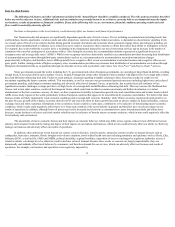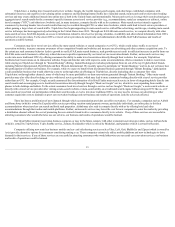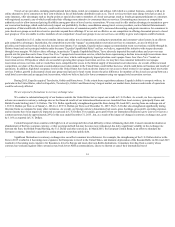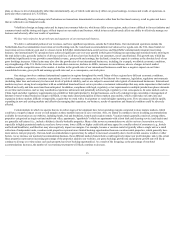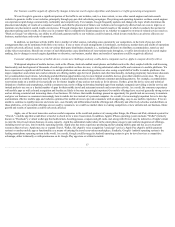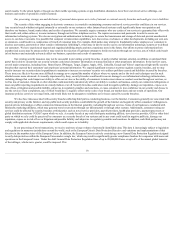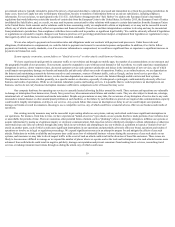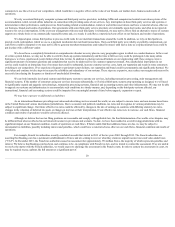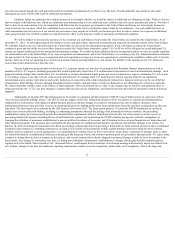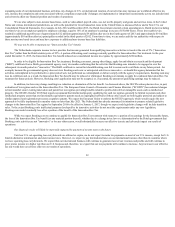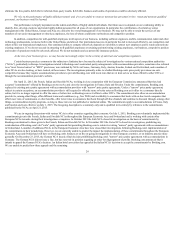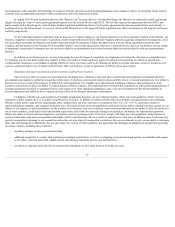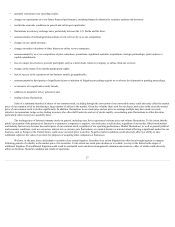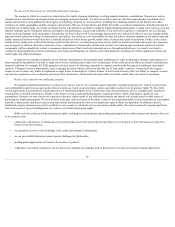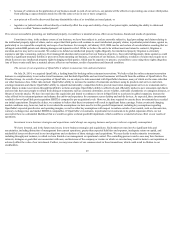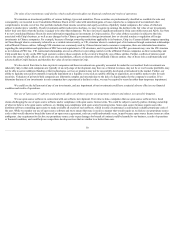Priceline 2015 Annual Report Download - page 23
Download and view the complete annual report
Please find page 23 of the 2015 Priceline annual report below. You can navigate through the pages in the report by either clicking on the pages listed below, or by using the keyword search tool below to find specific information within the annual report.
consumers to use the services of our competitors, which would have a negative effect on the value of our brands, our market share, business and results of
operations.
We rely on certain third-party computer systems and third-party service providers, including GDSs and computerized central reservation systems of the
accommodation, rental car and airline industries in connection with providing some of our services. Any interruption in these third-party services and systems or
deterioration in their performance could prevent us from booking related accommodation, rental car and airline reservations and have a material adverse effect on
our business, brands and results of operations. Our agreements with some third-party service providers are terminable upon short notice and often do not provide
recourse for service interruptions. In the event our arrangement with any such third party is terminated, we may not be able to find an alternative source of systems
support on a timely basis or on commercially reasonable terms and, as a result, it could have a material adverse effect on our business and results of operations.
We depend upon various third parties to process credit cards for our merchant transactions around the world. In addition, we rely on third parties to
provide credit card numbers which we use as a payment mechanism for merchant transactions. If any such third party were wholly or partially compromised, our
cash flows could be disrupted or we may not be able to generate merchant transactions (and related revenues) until such a time as a replacement process could be
put in place with a different vendor.
We do not have a completely formalized or comprehensive disaster recovery plan in every geographic region in which we conduct business. In the event
of certain system failures, we may not be able to switch to back-up systems immediately and the time to full recovery could be prolonged. Like many online
businesses, we have experienced system failures from time to time. In addition to placing increased burdens on our engineering staff, these outages create a
significant amount of consumer questions and complaints that need to be addressed by our customer support personnel. Any unscheduled interruption in our
service could result in an immediate loss of revenues that could be substantial, increase customer service costs, harm our reputation and result in some consumers
switching to our competitors. If we experience frequent or persistent system failures, our reputation and brand could be permanently and significantly harmed. We
have taken and continue to take steps to increase the reliability and redundancy of our systems. These steps are expensive, may reduce our margins and may not be
successful in reducing the frequency or duration of unscheduled downtime.
We use both internally developed systems and third-party systems to operate our services, including transaction processing, order management and
financial systems. If the number of consumers using our services increases substantially, or if critical third-party systems stop operating as designed, we will need
to significantly expand and upgrade our technology, transaction processing systems, financial and accounting systems and other infrastructure. We may not be able
to upgrade our systems and infrastructure to accommodate such conditions in a timely manner, and, depending on the third-party systems affected, our
transactional, financial and accounting systems could be impacted for a meaningful amount of time before upgrade, expansion or repair.
We may have exposure to additional tax liabilities.
As an international business providing reservation and advertising services around the world, we are subject to income taxes and non-income based taxes
in the United States and various international jurisdictions. Due to economic and political conditions, tax rates and tax regimes in various jurisdictions may be
subject to significant change. Our future effective tax rates could be affected by changes in the mix of earnings in countries with differing statutory tax rates,
changes in the valuation of deferred tax assets or changes in tax laws or their interpretation. If our effective tax rates were to increase, our cash flows, financial
condition and results of operations would be adversely affected.
Although we believe that our tax filing positions are reasonable and comply with applicable law, the final determination of tax audits or tax disputes may
be different from what is reflected in our historical income tax provisions and accruals. To date, we have been audited in several taxing jurisdictions with no
significant impact on our financial condition, results of operations or cash flows. If future audits find that additional taxes are due, we may be subject to
incremental tax liabilities, possibly including interest and penalties, which could have a material adverse effect on our cash flows, financial condition and results of
operations.
For example, French tax authorities recently concluded an audit that started in 2013 of the tax years 2003 through 2012. The French authorities are
asserting that Booking.com has a permanent establishment in France and are seeking to recover what they claim are unpaid income taxes and value-added taxes
("VAT"). In December 2015, the French tax authorities issued an assessment for approximately 356 million Euros, the majority of which represents penalties and
interest. We believe that Booking.com has been, and continues to be, in compliance with French tax law, and we intend to contest the assessment. If we are unable
to resolve the matter with the French authorities, we would expect to challenge the assessment in the French courts. In order to contest the assessment in court, we
may be required to pay, upfront, the full amount or a significant part of
20



